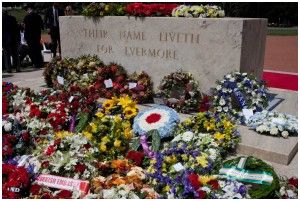26th April 2013
35,000 silent mourners at ANZAC Day commemoration

The silence of 35,000 people gathered in pre-dawn darkness is a genuinely spine-tingling experience. Every year more and more Australians seem to want to turn out for what is both an annual commemoration of Australia’s war sacrifices and a proud expression of national identity.

Before the service, Corporal Ben Roberts-Smith, one of Australia’s four living Victoria Cross holders, read out letters from Australian soldiers serving in Afghanistan. I was reminded of when my Mum showed me letters my Grandfather had sent home from the Somme to my Grandmother. He was not an educated man, but they were moving in their very simplicity.
I have been thinking about the First World War recently, because my daughter is currently studying the poems of Edward Thomas at school.
His poems document the struggle of a pacifist, bookish man to decide whether he should follow his friends in signing up to fight in a war he wasn’t sure he really believed in. It is the long walks in his beloved countryside, that ultimately convince him that his country is worth fighting for:
“She is all we know and live by, and we trust
She is good and must endure, loving her so”
He did go, and paid the price.
As Britain’s High Commissioner I am invited to lay a wreath of poppies at the National War Memorial on various occasions during the year. It always feels an enormous privilege to be doing so. I’m often doing it alongside political leaders and military commanders. I sense that we all feel humbled by the experience.
The “diggers”, ordinary soldiers who’ve gone off to fight for Australia in many conflicts since the tragic Gallipoli landings of 1915, are an enduring image of Australian grit. One of the ways that people try to associate themselves with the digger is by playing the Australian soldiers’ traditional game of “two-up”, tossing three coins and betting on whether more heads or tails will appear.
It’s an ANZAC day tradition – in fact it’s only legal to play it in pubs on this day each year. At a local pub I was invited to be “spinner”, tossing three old pennies (from the days before Australia moved to dollars and cents in 1966). In front of a baying, but good-natured crowd of more than a hundred punters, I placed the coins on the “kip”, a small piece of flat wood, and gingerly tossed them into the air.
So many Australian traditions come together on ANZAC day, it’s a wonderful opportunity to be part of it.